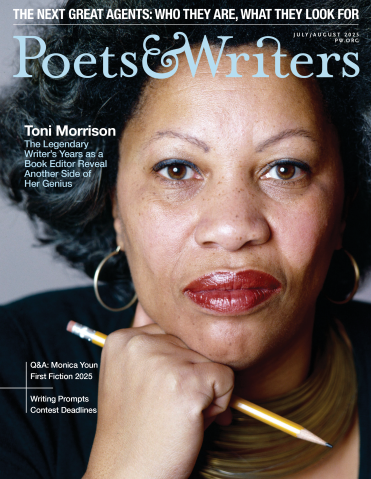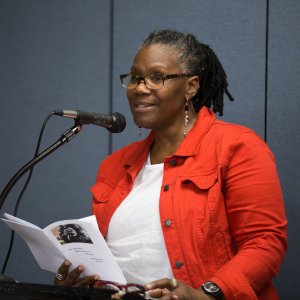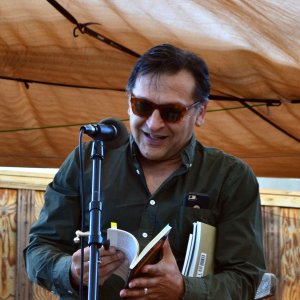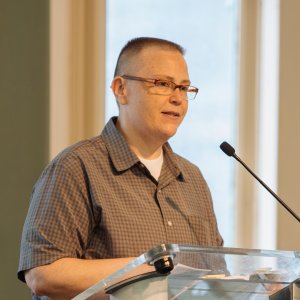In an essay for Business Insider, Alice Amayu writes about being accepted into the University of Sydney’s creative writing graduate program and deciding not to enroll after seeing how AI is “ruining the media landscape and the book industry.” Amayu writes: “There are days when I wonder what my classes would have been like, and it makes me sad that I’ll never experience them. Many people are still pursuing MFAs, and it’s still worth it.”
SIGN UP
Writing Prompts
-
In a 4Columns review of After Words: Visual and Experimental Poetry in Little...
-
“Their romance has started in earnest this summer, but the prologue took up the whole previous...
-
Written and directed by Celine Song, Materialists is a film about a matchmaker at a high...
Tools for writers
Daily News
According to Publishers Weekly, Humanities Tennesee recently announced that Southern Festival of Books will return this year after months of uncertainty “following federal funding cuts.” Thanks to “community support, new donations, and an expanded partnership with Vanderbilt University,” the festival will be held from October 18 to October 19.
In an interview with the Guardian’s Hannah Marriott, Barbara Kingsolver talks about Higher Ground, the recovery residence that she recently established using royalties from her best-selling novel Demon Copperhead, a retelling of Dickens during Virginia’s opioid crisis. The residence, Marriott writes, “provides a safe place to live for women whose lives have been torn apart by addiction, who are seeking long-term recovery.”
Emma Alpern of New York magazine explores the lasting appeal of literary authors on Substack, such as George Saunders, Garth Greenwell, Brandon Taylor, and Ottessa Moshfegh. “[M]uch of what’s popping up on Substack is appealingly specific, the kind of stuff that’s unpublishable elsewhere,” Alpern writes.
The BBC’s Steven McIntosh unpacks the details of an investigation by the Observer’s Chloe Hadjimatheou into author Raynor Winn’s best-selling book The Salt Path. Hadjimatheou alledges that Winn fabricated or gave misleading information about some parts of the narrative of her book, which chronicles the author’s 630-mile walk on the South West Coast Path in England with her husband, who had received a diagnosis of a terminal illness. Winn has described the Observer’s article as “highly misleading.”
Sophia Valchine of the Detroit Free Press argues in USA Today that authors who use AI are lazy, pointing to AI prompts accidentally embeded in novels by authors Lena McDonald and K.C. Crowne. “I believe authors are turning to AI because they don’t want to think,” Valchine writes.
Rachel Brooks writes for Monitor on Psychology about how psychologists are combatting censorship to keep culturally diverse books accessible to the public. Research has shown that stories featuring marginalized characters have positive effects such as increasing children’s reading time and reducing in-group favoritism. Another study showed that thirty books frequently challenged in Florida were not connected to negative behavior in terms of civic involvement, mental health, school grade point average, or crime. Ironically, in some cases, the reading was associated with positive outcomes like improved civic and volunteering behavior. Brooks writes that psychologists are well-positioned advocates in the book banning conflict because they can address the important role books play in children’s development.
The 150th issue of the Believer is being published today. The anniversary issue features work by writers including Sheila Heti, Charles Johnson, and Joan Silber, among others.
The Academy of American Poets has announced that its president and executive director Ricardo Maldonado will step down on July 17. In a statement, Maldonado said, “Looking ahead to my own future, I’ve decided that it’s time for me to step down from this role in order to return to my first calling—writing—and to make space for poetry in a more personal way. I leave this role with immense gratitude for our dedicated board of directors, our chancellors, our brilliant staff, and the ever-growing community of poets and readers who make this work possible.” The Academy has opened a search for its next president and executive director.
For the New York Times, J. D. Biersdorfer recommends tools for organizing your digital library. If the e-book app on your phone or tablet is overflowing with outdated files, Biersdorfer outlines methods for clearing and sorting books in the Kindle mobile app, Apple Books library, Google Play Books library, Nook app, and Kobo app.
Nitish Pahwa writes for Slate about the lawsuits that are deciding whether tech companies have the right to train their LLMs on copyrighted works. A district judge ruled last week that Anthropic did not violate copyright law when it used the works of three authors to train the company’s chatbot, but that Anthropic’s use of pirated materials did violate copyright law. A new trial is scheduled to decide the damages owed from Anthropic’s illegal downloads of pirated works. Another lawsuit filed by a group of authors that included Sarah Silverman, Ta-Nehisi Coates, and Richard Kadrey, was brought against Meta on similar grounds. The plaintiffs argued that AIs trained by copyrighted works undercut the authors’ ability to negotiate other book deals. The judge in that case sided with Meta on the grounds that the plaintiffs “made the wrong arguments.” The judge said it would be hard to defend fair use for “a tool to make billions or trillions of dollars while enabling the creation of a potentially endless stream of competing works,” but concluded that the plaintiffs chose a bad argument, because Meta’s AI did not reproduce enough text from the authors’ books to constitute plagiarism or piracy.
In an unexpected reversal, the Senate has voted to kill an AI-law moratorium, which would have blocked states from regulating artificial intelligence for the next decade, the Washington Post reports.
Lauren Groff has announced her next book will be a short story collection called Brawler, to be published by Riverhead Books on February 24, 2026, Elle reports. Brawler is Groff’s first collection since 2018 and jumps from Florida to California to New England and beyond. The cast of characters includes a mother and her children attempting to escape from an abusive husband; a young woman newly responsible for a disabled sibling; and a group of classmates gathering to say goodbye to their dying friend; among many others. Each story touches on, as Groff puts it, “the violence that lurks within familial spaces,” which reverberate within the “larger moments of cultural violence that I think we’ve been in for a very long time.”
Noah Hawley writes for the Atlantic about how Kurt Vonnegut processed the violence and randomness of war in his 1963 novel, Cat’s Cradle. Vonnegut, who served in the U.S. Army during World War II, considered survival a “kind of cosmic joke,” Hawley writes, “with death being the setup and life being the punch line.”
An exhibition celebrating Jane Austen acknowledges the author’s unenthusiastic relationship to Bath, the English city where she lived from 1801 to 1806, the Guardian reports. The exhibition, which is titled The Most Tiresome Place in the World: Jane Austen & Bath, will open at the No. 1 Royal Crescent in Bath on July 5. The exhibition’s title is taken from a conversation between Henry Tilney and Catherine Morland in Austen’s 1817 novel, Northanger Abbey. Tilney says, “For six weeks, I allow Bath is pleasant enough; but beyond that, it is the most tiresome place in the world.”
Farrar, Straus and Giroux (FSG) has announced its plans to relaunch North Point Press, Publishers Weekly reports. North Point Press was originally founded in Berkeley, California in 1978 by William Turnbull and Jack Shoemaker to publish literary fiction and nonfiction. The press closed in 1990, and FSG acquired its publishing assets in 1992. Catherine Tung will oversee the relaunch of the press as senior editor. North Point will cover categories including ecology, natural history, environmental science, personal growth, psychology, spirituality, food, design, and health.
A group of more than seventy authors including Dennis Lehane, Gregory Maguire, and Lauren Groff released an open letter published on Literary Hub about the use of AI, NPR reports. The letter was addressed to the big five U.S. publishers along with “other publishers of America,” and asked the companies to promise that “they will never release books that were created by machines.” The letter—which also included requests to refrain from replacing publishing house employees with AI tools and to only hire human audiobook narrators—garnered more than a thousand signatures in less than a day.
Joseph Bernstein writes for the New York Times about why men have stopped reading fiction and considers efforts by book clubs, publishers, and booksellers to combat the trend. Bernstein writes, “for men to read more fiction as the world of the novel exists today would not just require more stereotypically masculine subject matter. It might be a matter of men approaching their reading lives a little more like women do—getting recommendations online from celebrities and influencers, browsing together, forming book clubs.”
Kyle Chayka writes for the New Yorker about recent studies that demonstrate how AI is homogenizing our thoughts and writing. One study at the Massachusetts Institute of Technology found that people who used ChatGPT to write an essay demonstrated less brain activity than those who did not. Another finding was that the texts produced by AI converged around common words and ideas. “A.I. is a technology of averages,” Chayka writes, “large language models are trained to spot patterns across vast tracts of data; the answers they produce tend toward consensus, both in the quality of the writing, which is often riddled with clichés and banalities, and in the calibre of the ideas.”
Clare Mulroy writes for USA Today about Julia Whelan—a voice actor narrating the audiobooks for a range of best-selling contemporary novels. Whelan has narrated Atmosphere (Ballantine Books, 2025) by Taylor Jenkins Reid, Great Big Beautiful Life (Berkley, 2025) by Emily Henry, and Bury Our Bones in the Midnight Soil (Tor Books, 2025) by V. E. Schwab, among other titles. Whelan discusses her path to narrating dozens of books per year, the threat of AI encroaching on the audiobook industry, and Audiobrary, the audio platform she founded that applies publishing models with royalties to both narrators and authors.
Literary Events Calendar
- July 9, 2025
Writers' Room of Boston - Summer Sundown Writing Series
Online7:00 PM - 8:00 PM EDT - July 12, 2025
Up Close and Personal: Creating Dynamic Characters (Zoom)
Online12:00 PM - 2:00 PM EDT - July 12, 2025
I Thought I Was the Only One: A Hands-on Storytelling Workshop
Online1:00 PM - 2:30 PM EDT
Readings & Workshops
Poets & Writers Theater
Most Recent Items
Classifieds
Writing contests, conferences, workshops, editing services, and more.
Jobs for Writers
Search for jobs in education, publishing, the arts, and more.











